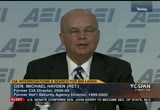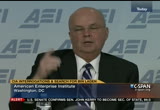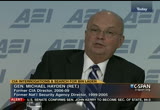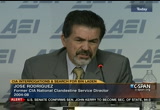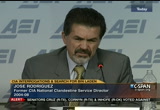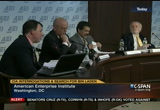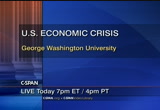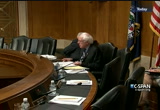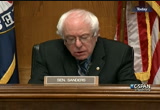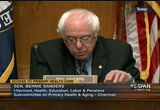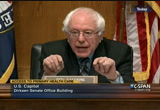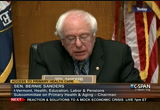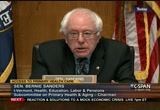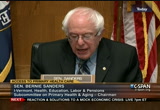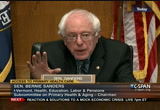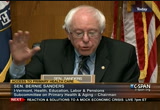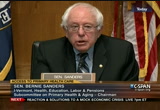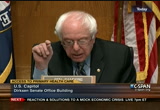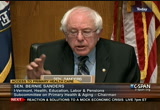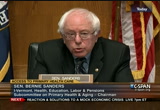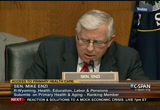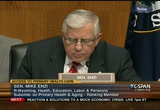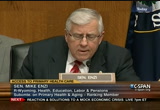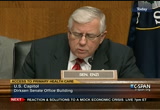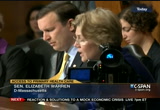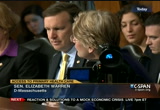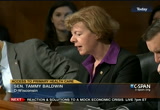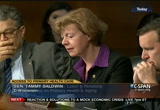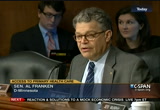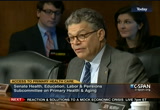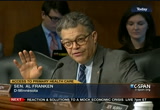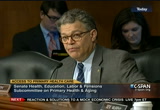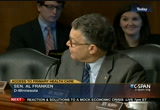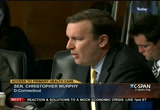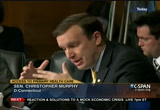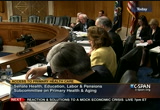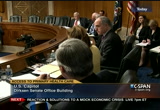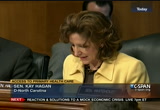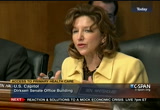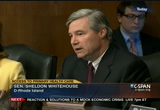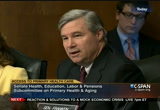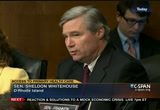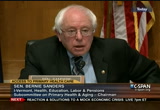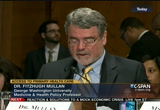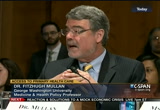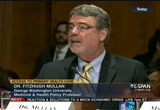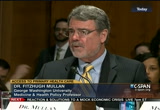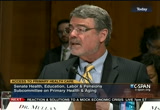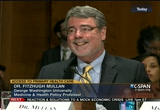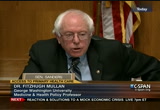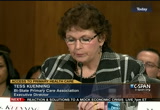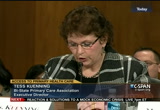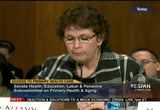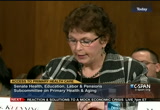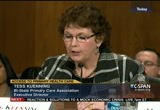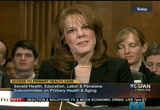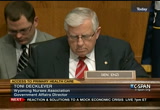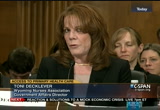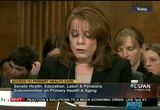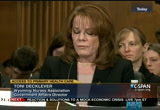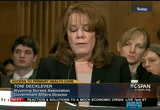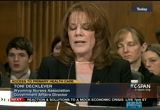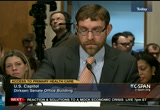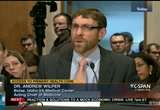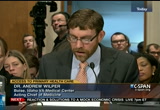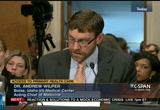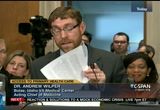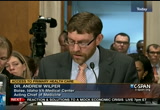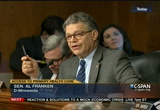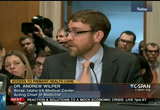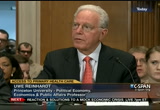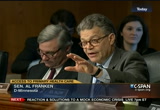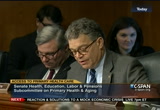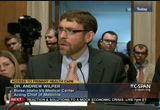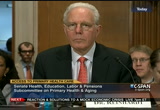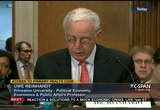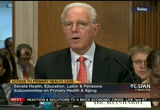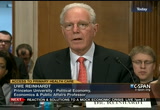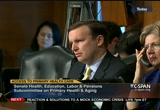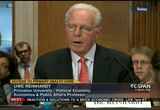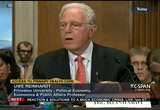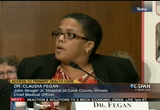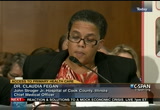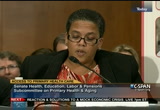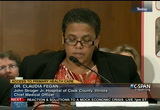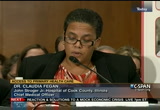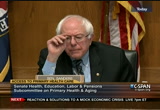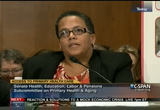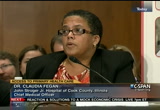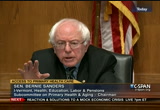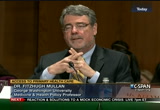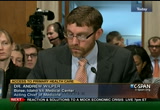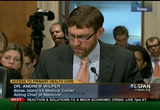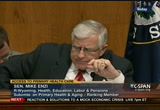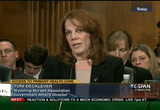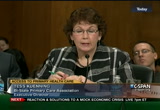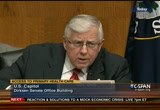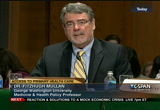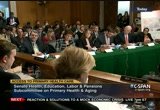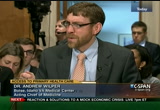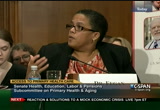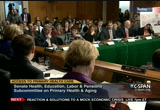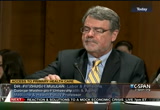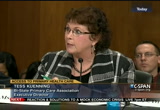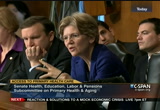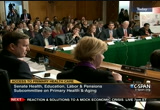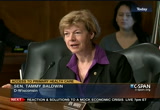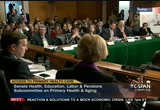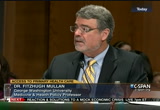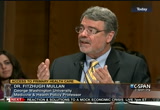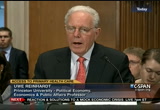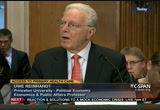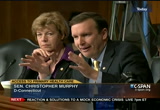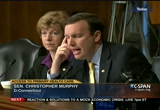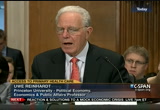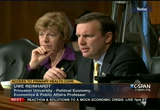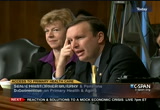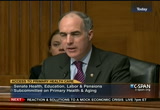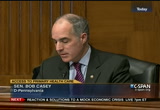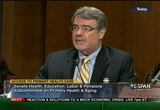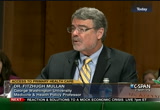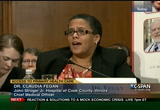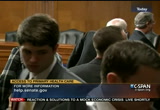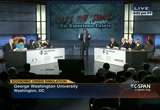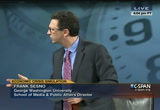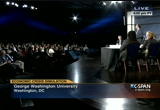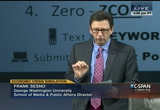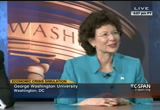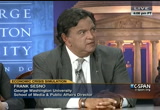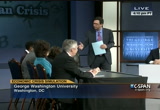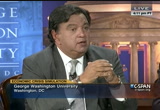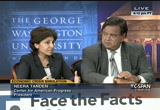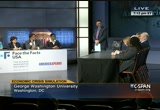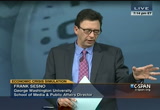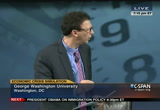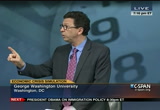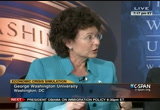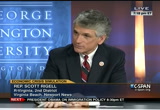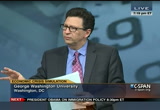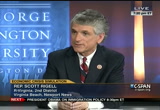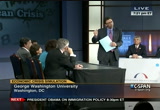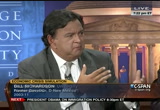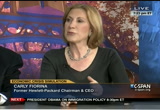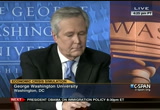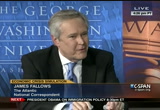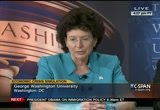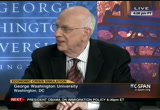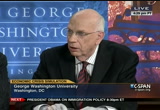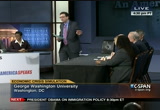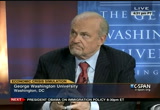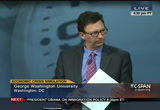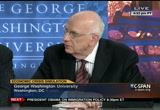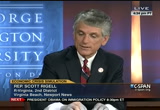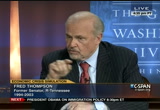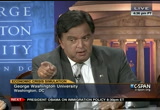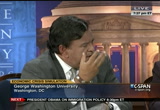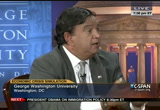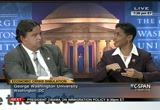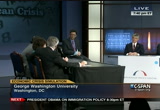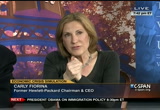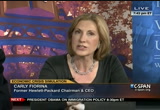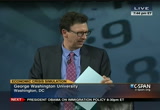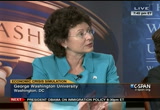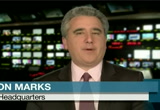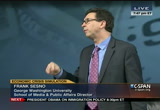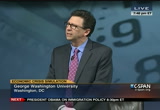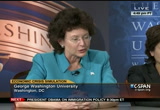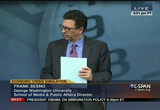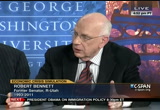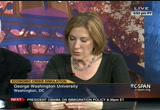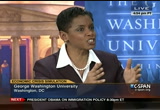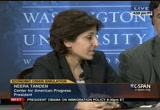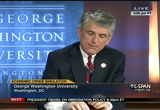tv Public Affairs CSPAN January 29, 2013 5:00pm-8:00pm EST
5:00 pm
we understand that. there are risks. i went to the german embassy in 2007. the ambassador had all of the ambassadors to the yes for the -- us. i said list of about detention and interrogation. i laid it out. let me give you four sentences. we believe we are a nation at war with al qaeda and the affiliate's. my moral and legal responsibility is to take it to that enemy. there's not another country in the room who agreed with any of those four sentences. the not only rejected it for them, and they had serious questions about the legitimacy of the questions for us.
5:01 pm
sometimes you have to forgo things that in your mind are ethical, legal, and effective because secondary and tertiary effects of taking that course of action main let's take target of killing. i said on cnn sunday morning, there was a time -- i knew there were secondary effects was the primary effect was so important because of the degree of danger that existed at the time. now the environment as changed the degree is somewhat different. now those effects might become dominant. yes, i can see a down side for doing things that you believe are effective and legal and appropriate if it denies you the cooperation of others who see it in a different way. i think we're all aware of that.
5:02 pm
we knew that. in 2006, it was huddle up, the world has changed, what is appropriate going forward with no judgment whatsoever on what went on before. different circumstances, different people. not -- >> not having read the report, i would say that become its released it needs to be fixed if, in fact the interrogation program had no value. they need to take a second look and maybe spend more time and talk to those who were involved in the program. in terms of the ethical question, in writing hard measures, i spent a lot of time talking to people who worked with me. some of my deputies were very
5:03 pm
senior analysts, very logical. these are folk who is will analyze every aspect of everything. i asked him this question and he gave me a long explanation, 15 -minute explanation on why he thought it was ethical and why he agreed to participate in the first place. he provided arguments i never considered. to a certain extent i was amazed. different people have different ways to come to a conclusion on whether it is a ethical or not. in his case, he thought about it for a long time. he researched a lot of things. in my case and maybe because i'm an operational officer, pretty quickly i was told it was legal,
5:04 pm
i had no issue ws the procedures , i knew many of the procedures were applied to tens of thousands of u.s. soldiers. so -- then when i look at the purpose here to protect america and save american lives. when i saw the threats that we were facing, which were of great concern. it not that hard for me to make that decision. >> i think we've come to the end of our time. just to conclude, say we were facing threats and the three men on our panel today are large part of the reason why we did not experience another september 11, 2001. i thank you for not only being here today but to your service to our country. thank you very much.
5:05 pm
[applause] >> senator john kerry has been confirm bid the senator to be the next secretary of state. three republicans voted no, ted cruz of texas and senator of oklahoma. tonight, george washington university is hosting a role playing simulation dealing with an economic crisis. among the participants is the governor bill richardsons and foorm herb c.e.o. of hewlett-packard. hosted by former cnn chief. earlier today the president called for an over haul of the immigration law.
5:06 pm
the president made this speech earlier this afternoon and we will have it again at 9:30 here on c-span. >> all of us worked hard for causes way before we got to the white house. so the white house was an enormous push. i think the ladies would agree that the day before you are married to the president-elect, nobody gives a darn what you say. the day after he is the president-elect people think you are brilliant and your cause is very good. [applause] >> c-span's new original series, the first ladies, their public and private lives and they influence on the president. produce bid the white house historical association. that is on c-span, c-span radio,
5:07 pm
and c-span.org. 70% of medical doctors are specialists and 30% are primary care fissions. a sub committee looked at access to primary care. the hearing's chairman called the situation "a major crisis." . doctors testified at this two hour hearing. >> this will cover an e-- enormously important issue. i look forward to a productive working relationship. vermont is a rule state. i know something about rural
5:08 pm
problems and his state is a lot more rural. we will see how we can go forward together. in our country today, -- before i begin that i want to thank the panelists for being here today. we have a great set of panelists from all parts of the country and we thank them for being here and for the work they do every day for providing health care and doing research. if your country, as many people know, we spend almost twice as much as do the people of any other country per capita on health care. that is about 18% of our g.d.p. our health care outcomes in terms of life expectancy and disease prevention is not good. one of the reasons for that is
5:09 pm
we have a major crisis regarding primary health care access, which results in low-quality health care for people and greater expenditures. low-quality health care and we end up spending more than we should. today, 57 million people in the united states one in five americans cannot see a doctor when they need to. lack of access to a primary care provider is a national problem but those who are most impacts are people who are low-income, minorities and seniors and those who live in rureyull areas such as vermont and wyoming. we've seen before that groups that need health care the most are the least likely to receive it. the good news is that just 11 months from now we will be
5:10 pm
providing health insurance to 30 million more americans through the affordable care act. the bad news is we don't know how we're going to be providing primary health care to those americans who now will have health insurance. let me just rattle off some statistics that i think should be a concern for the congress and, in fact, all americans. not widely known, about 45,000 people every single year die in the united states of america because they do not have health insurance and that do not get to a doctor on time. 45,000 americans. according to to the health administration we need 16,000 primary practitioner to meet the
5:11 pm
need that exists today. over 52,000 primary care physicians will be needed by 2025. in 2011, about 17,000 doctors graduated from american medical schools, despite the fact that over half of patient visits are for primary care, only 7% of the nation's graduates now choose a primary care career. 7%. nearly all of the growth in the number of doctors per capita over the last several decades have been due to a rise in the number of specialists between 1965 and 1992. the primary care physician grew by only 14%. while the specialists the population ratio exploded by
5:12 pm
120%. the average primary care physician in the united states is 47 years of age. one quarter a year on retirement. in 2012, it took about 45 days for new patients to see a family doctor up from 29 days in 2010. even if you can find a family provider it often takes longer than it should to see him or her. only 29% of u.s. primary care practices provide access to care on evenings, weekends, or holidays. in other words, our culture is don't get sick on saturday, sunday, or at night. 9:00 to 5:00 works pretty good. half of emergency room patients would have gone to a primary
5:13 pm
care provider if they had been able to get an appointment at the time one was needed. in other words, we are wasting billions of dollars because people end up in the emergency room for noneher gent care because they can't find a primary health care physician. in my view, and i think the view of all the experts who have studied this issue, primary care is intended to be and should be the foundation of the u.s. health care system. in 2008, americans made almost one billion office visits to the doctor, 50% of those visits were to primary care doctors. according to almost every study done, access to primary health care results in better health outcomes and lower spending by not only reducing emergency
5:14 pm
room, but when you get people to the doctor when they should they don't get sicker than they otherwise would be and end up in the hospital at great costs. the problem we are discussing a national probable. but it is worse for -- national problem but it is worse for rural regions. double the ratio in rural community where is it is 46 per 100,000. urban communities have problems and rural communities have greater problems. 65% of primary care health care physicians shortages are in rural communities. in my state we do better than the rest of the country in terms of health care providers. i can tell you in vermont people have difficulty getting to the
5:15 pm
primary care provider they need. 20% of americans live in rural areas only 9% of physicians practice there. one of the significant difference tweens the u.s. health care system and the health care systems of other highly developed countries, which could significantly explain why we spend more than other countries is the ratio of primary care physicians to specialists. in the united states, roughly speaking 70% of our practitioners are specialists and 30% are primary health care providers. around the rest of the world the number is the opposite. 70% of of their practitioners are primary health care providers. what can congress do? let me rattlele off a few
5:16 pm
points. first, we must address the issue of primary care reimbursement rates. specialists earn as much for their lifetime of practice as much as $2.8 million more than primary care providers. if you're going into medicine and you're a specialist you can earn almost $3 million more than a primary care practitioner. radioologist earn twice that. the system is largely determined by the 31 physicians who sit on the medical association committee. the committee whose payments recommendations are accepted for medicare and medicaid services over 98% of the time and adopted
5:17 pm
by many private insurancer dominated by specialists. so specialists sitting on the committee determine reimbursement rates. we have to look at that. the teaching hospitals without requiring any emphasis on training primary care doctors. that'ses a serious issue. thirdly, unlike other nations which provide financial support for medical school education, we by in large do not do that in this country. the result is, the median debt for medical students is more than $160,000 and almost a third leave school more than $200,000 in debt. if you're leaving school with that much debt what are you
5:18 pm
going to do? you're going to gravitate to those fields that pay you higher incomes. so if we're going to attract young people into primary health care we must make that profession more financially attractive. we need to address the issue of reimbursement rate. second of all in recent years, i've worked on this issue. we have greatly expanded community health centers around the country. community health centers provide good quality, cost-effective health care. we need to do more than that. we made progress and we need to make more progress. we need, in recent years we have increased funding for the school . if you're graduating medical school it says we're going to help you address that debt,
5:19 pm
we'll help you if you practice in under served areas. teaching health centers, studies have shown that residents train or rural communities are more likely than those trained in other settings to make a career practicing in under served or rural areas. the program was the only new investment in graduate medical education in the affordable care act. we've got to expand that concept. we have to take a hard look at the role of health care providers and others. hows do we better utilize those people. we have a serious problem. the lives of thousands of people depend on what we do. i am very excited about the wonderful panelists here at this hearing. i would like to hear from the senator who has done so much
5:20 pm
work on this. >> thank you, mr. chairman. i'm glad to join you for this part of the sub committee. i would like to thank you the witnesses to take their time out of their schedules. i appreciate that you made the long trip across the country to be here. it is a pleasure to welcome all witnesses to the hearing. in aligning the our health care work force is important to all of us, but one that is significantly given the obstacles that people face in wyoming. 47% of the population lives in a county with fewer than six residents per square mile.
5:21 pm
200,000 residents live in areas with inadequate access to dental and primary care. we have one hospital that is served by a physician that every time we lose that physician the hospital closes. to that end the state has developed a number of programs that is taylored to meet the needs of a frontier state. we have miles and miles and miles. recruiting health care professionals to live and work there is an ongoing challenge. the wyoming department of health operates its own repayment program along with a grant program. these programs work to reduce the high cost of education and training programs which is a deterrent to work in lower income medical fields.
5:22 pm
this collaborative arrangement mean the major made cal and the university of wyoming and other key partners maintains an extensive database on fatiffles and their need for professionals. >> there's more that can be done to better align federal programs to meet the needs of rural and frontier states. they are based on factors that make it difficult to improve the needs of the under served and frontier areas. for example, one provider for 3,500 people in new york city is different than 3,500 people living in fremont county.
5:23 pm
we need to think differently on how to use technology services to improve capabilities so that where a person lives has less impact on the degree of care they receive. we've had quite a bit of success with that and the outreach clinics where they use medicine extensively with nurse practitioners handling the equipment. i hope this hearing will make it clear that we need to think more creatively and think of ways that all americans can access primary care services and make thursday that the people in the field are employed where they are most needed. again, i want to thank the witnesses for they participation, i want to thank
5:24 pm
the chairman for his great list of suggestions on the things that need to be done. i'm sure we have the capability to come up with solutions. >> senator warren was here first so you get five minutes. >> i just want to thank you very much for holding this hearing. i am very interested in a question about how we equalize access for all of our citizens and particularly how do we make the right investments to lore the overall cost of health care? what we're looking for is better oks at lower costs. -- outcomes at lower costs. i'm looking forward to hearing from each of the panelists. i want to thank the ranking member. i think the comments about
5:25 pm
access and the reminder that it is different in a large city than a rural area are comments that are well-taken and one for us to remember carefully. also, the reminder that can have different consequences evens in a state like massachusetts. obviously, we have very extensive health care services in some areas but it still leaves us with parts of the population with difficulties in accessing care. sometimes distance is less the challenge but costs can remain the challenge and transportation even within close areas can be a serious challenge. i appreciate the reminder of the diversity of issues that we face in making sure that all of our citizens have good access. thank you, mr. chairman. >> thank you. >> thank you, mr. chairman.
5:26 pm
i won't use the a lotted time in its entirety and apologize that i have to sneak out to be in another committee meeting. i appreciate your focus on this broad but critical issue that has so much relevance through tempably menation of the affordable care act. perhaps not as large spaces of rural areas but certainly has the array of challenges that are the subject of this hearing. i appreciate the attention that will be focused on it. one of the things that i hope we'll hear some ewill be ration on aside from -- elaboration on is the questions of lifestyle
5:27 pm
for primary care practitioners. things like the differences between the amount of time that somebody might be oncall as a specialist versus the primary care physician. as we look at larger repayment reforms and the practice on spending the adequate time with a with multiple chronic conditions that is necessary versus seeing someone in 15-minute increments. what impact will those policy changes have on the number and -- number of primary care practitioners in this country. but mr. chairman, thank you for focusing attention on this issue. i hope to return to and hear from the witnesses and ask my
5:28 pm
questions. >> thank you very much. >> thank you mr. chairman, for this important hearing. we have 30 million more americans, we hope that medicaid is adopted by the states -- the expansion of the medicaid. it is still leaving some people uninsured. i read the temps last night and it is very clear that when you insure people that their health kay oh are better and it costs us money when people aren't insured. so what we're doing and it is so clear -- sometimes you hear we have health care in this country just go to the emergency room. that's the most expensive health care and that does not mean you get treated after the emergency room. that does not mean you get what you need to treat a chronic condition.
5:29 pm
all of your temps put line on that and i appreciate that. in minnesota we do health care relative to the rest of the nation extremely well. we have been rated number one in providing by cost. we, like wisconsin, have a combination of urban centers and not the miles and miles of miles and miles. but we do have miles and miles. the ranking member -- who i would like to welcome to the sub commeen looking forward to partnering with on this. i admire his work on rural health which is so important in my state because there are people who are under served. one of the things that the
5:30 pm
chairman talked about was the student loans. graduating from medical school, the typical loan or debt of a $160,000 sometimes more. then talking about the tend dency for doctors to say how am i going to make this money? we have, yone, -- this is an issue thank you you talked about in you testimony. in our country, we pay specialists at a ratio more than primary care physicians than they do in other countries that do their health care very successfully and cheaper than we do. one of the things about student loans to me, there is nothing good about the high cost of
5:31 pm
college and graduate school in my mind except that it creates some tool for us to motivate people to go into the things that we need. the one question i would like the panel to think about -- i know you're going give your testimony and we're going to do questions. what is the return on investment if we say to doctors graduating medical school? are we doing some forgiveness for being a primary physician for a rural area. what is the return on investment if we raely encourage buy loan forgiveness and encourage dross go into primary care.
5:32 pm
in other words, what is the calculus there? what is the equation? if we raise -- if we say my goodness, it is such a benefit to society -- such a coast benefit to have a higher ratio of primary care physicians than if we said for anybody in those in the primary care medicine we will -- it is $100,000. right there, boom. what is the cost benefit there? it's good to see you. dr. rinehart and i have talked a number of times. but anyway, thank you mr. chairman for this unbelievably important hearing. thank you. >> thank you, senator. senator murphy? >> thank you very much, mr.
5:33 pm
chairman. i'm excited to be here with a fantastic panel. i will get out of the way so you can provide us with your testimony. let me just say this having chair on the health committee we grapple with this problem year after year. i remember one meeting i had with about 15 or 20 medical students of connecticut. at some point, we were talking about the affordable care act and how it could help medical students. we were talking about the high level of debt. i asked them how many are considering going into primary care? of the 15 students one raised their hand. only one was considering it. we started to exam this question on why they did not have it on their mind and certainly was the dollars is the first thing they mentioned.
5:34 pm
they could not figure out how they would make it work with the sally they would make as a primary care physician. as you tease a deerp answer out of each of them the second thing is press tidge. they did not feel there was any prestiege any longer. all of them had an ego to them that wanted to put them on the front lines of new medicine. i hope that is part of our hearing as well today. how do we put the practice of medicine back into primary care? how do we allow them to be more than gate keepers? i think there is a perfect opportunity as we roll out these new delivery models. as our world becomes interconnected and the multiple practice is the rule rather than the exception. you allow for primary care
5:35 pm
physicians to once again, control a lot more medicine than they used to control. the prestiege comes back in the control they have over the health care system at large. so i think as we build a new delivery system it is an opportunity, not to just address the critical question, how do they make their family's budget work? but how do they feel good about the medicine they are practicing and the value they are adding to their profession? that's been lost as well over the years as the prestiege has moved to the specialist reart than the primary care doctors. i imagine that we'll examine that as well. >> thank you. >> i will submit a statement for the record. i want to thank you for calling this hearing. this is a critically important
5:36 pm
issue. when we go to the attending physician as members of congress, we have a doctor available to us here at the capitol. that doctor is our quarterback who can make determinations about our health and can refer us to specialists who can help us. we hope that one of the conclusions that results -- or the goals here of all this work in this hearing and otherwise is that everyone has that primary care doctor, that quarterback in their life that can treat them but also get them access to specialists and the best care. thanks. >> senator casey. >> thank you very much. thank you for holding this hearing today. i think this is a critical issue facing our country today. i know in my state of north carolina we have more than a million people who don't have
5:37 pm
access to primary health care because of a shortage of providers. i know that when patients can see a primary health care doctor they frequently end up getting care, obviously. but what happens when they don't have the access? they go the hospital and that is where the treatment is so expensive and it is helping to drive up the cost of health care. also, if you have a chronic disease and you can manage that disease it is less costly. otherwise, they will develop into episodes. i know there are innovations going on in this area and one of them is in north carolina, the blue ridge community health services which is a health center in the western part of our state. it received a grant under the teaching health center program. in the blue ridge they served 20,000 patients last year with
5:38 pm
two primary care sites. they do outreach to the local domestic violence shelter. this funding has allowed them to increase the number of residents at this facility in hendersonville. i think that is critical to helping in providing more health care physicians. blue ridge is one of 34 federally qualified centers that provide that high-quality, cost-effective care. i know there is another provision that is important and that is the rural provision pipeline act that was included in the affordable care act. it gives medical schools the resources to recruit students from rural communities. if we can train physicians from those rural communities they tend to stay in rural
5:39 pm
communities. i think that is a highlight of this provision. programs like that have a significant role to play in relieving this primary care shortage. i look forward to hearing the testimony of all of our witnesses today. thank you. >> senator whitehouse. >> thank you for holding this hearing. you have drawn a big crowd, i think. this is an important issue. we're gearing up here in washington for the sum of fiscal cliff which is coming in a couple of weeks. with that looming, we're beginning to hear the usual refrain about how important it is to cut medicare benefits and to limit access to medicare for seniors. they say that is the responsible thing to do to save money which
5:40 pm
is an ill-informed idea. particularly in the context of a health care system that is 100 time mrs. expensive than it was in 1960. if you look at the graph, it is a curve in the upgrade of cost. that is probably 50% higher -- there's a 50% inefficientcy penalty that we pay compared to all of our industrialized competitors. it is $800 billion a year spend unnecessaryly. if you look at the scope of this and you think you're going to solve that by cutting medicare? it's simply not right. as the c.e.o. of kaiser said that is an inept way of thinking of health care. he says that is not just wrong
5:41 pm
but it is so wrong speed limit criminal. hearings like this that point out there is a problem with cost and the delivery system in the united states and we have to address that problem if we're not going to misdiagnose we have. if you have a misdiagnosis you don't get the right cure either. it is important that we don't throw seniors and medicare under the bus because we have failed to address the real problem in health care, which is rocketing costs that aren't just in medicare. medicare is probably the most efficient deliverer of our health care. if we get this right, 40% of the savings will come back into the federal budget but the rest will go to kaiser to blue cross to united. to businesses and families all across the country. we have a real fight on our hands to steer this in the right
5:42 pm
direction and i hope this hearing helps to make sure we make the right choice. >> through very much. i want to remind members of the senate and viewers on c-span that the report is available at my website. ok, you panelists have been patient. the good news is you have seen there is an enormous amount of interest in this issue. we're delighted that you are here and we thank you for the work you do. doctor, thank you so much for being with us. >> thank you mr. chairman. a great privilege to be here as a primary care physician who was
5:43 pm
in the first class of national service corps. it is not only a privilege but astounding to hear the committee speak with such clarity about the orphan issues of primary care and service delivery in poor and rural and under served communities. if i can get over my daze -- thank you so much for the thought that has gone into this. i'm going to run through -- you are clearly the expert so i will skip some of the stuff i was going to bring up and focus on the issues of education and skill building. the aging of the population and the affordable care act and the terrific entitlement it
5:44 pm
provides. we have about 280 physicians per 100,000 for the united states which puts us in the middle of the developed world. u.k. and canada have less. we're roughly in the middle. we have about 800,000 physicians but additionally we have 190,000 nurse practitioners, assistances . so we have almost a 25% add-on of providers that didn't exist 30 years ago. important to remember, when our work force was lean in the 1960's and 1970's we were very short. the congress agree and began a variety of programs. among those with the development of the nurse pratisher ins and the assistance it did not exist before.
5:45 pm
excuse me. so lean is not necessarily bad in terms of how we function if we want a more efficient system. there are systems that are used to the payments that they currently get and they are not going to change untils there -- there is a real sense of need. i think we need to think of the advantages, perhaps, and the creativity that can come from this period. in terms of the primary care challenge, i look it a in two ways. one, within the factory, the medical school, the teaching hospital and ted other is in the market. clearly we've had testimony as to the payment gap that exists that specialists make twice to what the generalist will make.
5:46 pm
that is a huge problem. while education and training is very important, what i do and believe in, you can do the best eanings training and if you put them out in the market with those kinds of incentives you will get what we're getting now. we have to deal with that. speaking on the educational side, the challenges are both medical school level and the residency level. what we call residency is very important and fluial of the natch of the type of -- inflew wential of the type that comes of of the pipeline. a natural dominance of the more research oriented and the specialty of sciences which are well-represented but the primary
5:47 pm
care culture is put in the back of the bus. you won't find a primary care physician that hasn't been told at some point, you're too smart to go into primary care. that culture is toxic and it is out there and we need to worry about it. the young doctor today is drawn to lifestyle specialties. this is a problem too with limited hours and refined knowledge requirements. one can understand those draws but we need to work on that. then, you have the sense of social purpose and social mission. our medical schools are well treated that provides about $70 billion a year. by medicare which provides $10 billion a year for teaching hospitals. very, very strong influence with no requirements in terms of work
5:48 pm
force product. given those two pay streams we put about $300 million into primary care physicians. you have $27 billion on one side and about $600 million which is promoting primary care careers. a huge imbalance so, again, not surprising the outcomes. the teaching health centers moves the paradigm out of the hospital and into the community. importantly, needs to gasht a pay stream. that is very important outcome and it is something that needs attention. the nurse practitioner p.a. is very important, we have 190,000. we need more. they are easily trained in learming numbers and that is very important feature as we look at scaling up our work
5:49 pm
force. finally, data and planning, we have a national health care work force voted in, it has not been funded. we need a better brain in our system. our system -- without a good system it will be deleted. we have a moral triumph and the entitlements that it brings but a technical challenge. in terms of legislative issues, the full fund and greater funding of the service corps will be essential. perhaps, most important is medicare g.m.e., we need to get a handle and use the $10 billion more constructive. thank you. >> thank you. for us to have a good question and answer, if people can keep their remark to five or six minutes. that would be appreciated.
5:50 pm
next we have the executive director of the primary care association. thanks for being with us. >> chairman sanders, ranking members and extinguished members of the sub committee. i'm the executive director in vermont. on behalf of the entire health center community, including more than 22 million patients nationwide, i want to thank you for the opportunity to testify on the role of community health care centers. as the committee is aware two important events have significantly altered the financing and delivery systems of our nation. the support's decision and the affordable care act, as a result, these estimate that almost 30 million americans will
5:51 pm
gain coverage through medicare or the health insurance exchange. yet, another 30 million will still remain uninsuranced. we support these expanses that open the door for more reform. coverage alone does not equate to access. it is access to regular care that makes coverage meaningful. to and chief a reformed system our nation needs sustainable solutions, low and manage our health care costs and ensure quality oh. in efforts to increase access must grow and expand our primary care infrastructure. community health care offers a unique and proven solutions to these challenges. health centers are located in under served areas and serve under served population and care for everyone regarledless of
5:52 pm
your ability to pay. it might surprise you that the community health center in vermont provides translations from the sudan, bosnia, that pal to name a few. the ability to receive care removes a major access barrier and improves the health of these families. i am able to speak other languages. i see first-hand benefit of this type of provider/patient relationship can provide. these families might delay seeking treatment until they are sick and have to go the emergency room room. the literature backs up these
5:53 pm
experiences. there is an article found that counties with a community health center had 25% fewer emergency rooms visits. over data demonstrates saved taxpayers about $25 billion by keeping these patients out of these settings. unfortunately, -- fortunately, with the leadership of this sub committee's chair had the foresight to include mandatory funding in the affordable care act to ensure the promise of coverage was met with the reality of care. we believe that seeing this plan through is essential. the community health care centers is not on track. we anticipate spending only $20 million in fiscal year funding
5:54 pm
in 2013. that's a full affordable care act provided for fiscal year 2013 be extended to care for 2.5 million new patients. the demand for centers continue to outpace the growth and more than 60 million americans still lack access to primary care. in new hampshire, all of our 19 centers have identified needs in their areas. i would be remiss if i fail to cite another vital program that serves home for under served americans. the poor places trained professions in these areas and remain a key partner to ensure that they can meet the demand for primary care that is looming around the corner. community health centers around the country are ready, willing, able, to be leaders in reforming
5:55 pm
our health system. we appreciate your leadership and look forward to your continued support as we work to provide meaningful access to all. thank you. >> thank you. >> it is my pleasure to toni decklever. we have 259 towns but we only have 14 towns where that exceeds the population. she's familiar with all of those and she wears several different hats. she a government liaison and has visited washington, d.c. previously to advocate for her fellow nurses. she's a state director for skills u.s.a. to improve the country's work force by preparing individuals for
5:56 pm
trained service occupations, including health occupations. she has a bachelors in science degree from the university of northern colorado and is a certified e.m.t. she has received many awards from work force groups. we're pleased to have her here today. i know it took 13 hours in airplanes and airports for you to get here. thank you. >> thank you for being with us. >> good morning, chairman sanders and members of the committee. thank you for the opportunity to testify today. as he stated i do represent the nurses association. i've been a registered nurse for almost 30 years. wyoming is the nineth largest state in the u.s. with almost 100,000 square miles of land but
5:57 pm
our population is the smallest in the nation with a little over half a million people. in rural environment impacts our health care system. we have 25 hospitals. there are also two veterans hospitals and 16 rural clinics. when dealing with the number of patients and the barriers to care for these patients several components need to be considered. one is the ability for providers to practice. another is addressing the shortage of providers due to retirement and the shortage of qualified faculty to train other providers. with baby boomers turning 65 at the rate of 10,000 a day there
5:58 pm
will be a demand for health care professionals. wyoming's nurses practice act allows nurse practitioners to practice independently in our state. disability helps to provide patients in rural access to primary care. some federal laws limit the nurse' ability to practice at their full scope. a medicare law has kepted r.n.'s from certifying medicare patients from a home health benefit. in an area where access the limits this provides delays in care. this delay inconvinces family and can lead to increase costs in the medicare system. patients are left in institutional settings or readmitted after discharge because they did not receive
5:59 pm
proposal home care. a sufficient supply of nurses is critical now and into the future. registered nurses are the backbone of hospital, community health clinics and home health and long-term programs. according to the 2008 study, over one million of our nurses are over the age of 50 with one quarter of these nurses over the age of 60. much like rural populations the population is aging. this is in addition to the increasing aging population. studies have identified that the amount of providers is an obstacle. wyoming respond bid creating a funding strain that would assist nurses in continuing their education.
6:00 pm
this allowed the nursing programs to increase their enrollment numbers and educate more registered nurses. they respect continued to continue their education into these advanced practice level. wyoming has a small amount of loan incentive need for students but it does not meet the demand. some students are able to receive funds from title 8 and title 7. the perception that health care is delivered in bigger health centers equalsnot easily overco. many residents are using health services in surrounding states that could house and addressed in wyoming. we should stabilize the system with a primary care providers, tertiary centers, a medical home concept, a collective
6:01 pm
planning and policy implementation, effective use of pooled financial resources, shared responsibility for achieving goals for our original health, and organized leadership, that keeps the state responsible -- responsive to changing needs. there is federal eligibility for funding and enhanced reimbursements for rural clinics. medically underserved areas and populations are based on factors that make it difficult to prove the need of the underserved in rural and frontier areas. one provider per 3500 people in an urban setting is entirely different than 3500 people living in a county that is almost 10,500 miles of land mass. wyoming's economy is based primarily on energy production -- coal, natural gas, uranium, and even wind, making it a boom and bust economy. many working in the agent -- in the area make significant salaries when they work, but
6:02 pm
this can skew the average income for families. although some do well financially, there are a number of people struggling to make ends meet. this income disparity can be a challenge to meeting designation guidelines. thank you for your time and attention to this very important matter. i look forward to any questions you may have. our fourth witness is the acting chief at the boise medical wrote center. dr. wilbert is the associate program director for the internal medicine program and the va center of excellence in primary care education. thanks very much for being with us. >> thank you, chairman sanders and members of the committee. it is a great honor to be able to testify here today. i was asked by senator sanders
6:03 pm
about my insight. specifically, and insight about the lack of health insurance in the u.s., and its affect on outcomes, and to share my thinking is on the physician and workforce shortage the we face. to start off, and there is enormous literature that has occurred over decades, demonstrating that a lack of health insurance has led to worse health outcomes. the institute of medicine summarized these findings in a six volume series earlier this century. the conclusions were clear. subsequent work has to build on this evidence, including some of my own that senator senders mentioned in his opening statement. specifically, a paper we published in 2009 in "the american journal of public health," the lack of insurance to 45,000 deaths among adults in the united states annually.
6:04 pm
health insurance leads to significant benefits and is good for your help. gaining health insurance does not guarantee access to medical care, which is the second part of my testimony, nor does it control costs. the singular intervention we could make of the national level to improve outcomes is to bolster our primary care workforce. there is an additional massive body of literature supporting the idea that primary care improves all sorts of health outcomes and lowers costs. nevertheless, we have not seen systematic changes to abbreviate the shortage in the u.s. in decades. i will talk about three policy levers that i see that this committee could consider to increase the number of physicians entering the primary care work force, some of which have been referred to by professor mollen. at the medical school level,
6:05 pm
when people graduate from college and are in undergraduate medical training, we could introduce additional debt reduction, change federal funding streams to encourage primary care, and increase funding for the national health service corps. which could incentivize third and fourth year medical students to enter primary care, careers. in the area of graduate medical education, he title 7 funding is earmarked to go toward primary care programs. these are continuously under threat of congressional cut, and have been cut dramatically in the last 10 years. reemphasize and that funding would be an important step. second would be a direct payment by medicare to teaching hospitals to offset the expense of training physicians. nearly $10 billion is spent by the federal government to support these hospitals. but currently we have no planning in place to actually meet the needs of our coalition
6:06 pm
in the united states, with regards to a physician work force. medicare should direct funding to residency programs for education, rather than directing it to hospitals. there should be a community and regional work force for hospitals to qualify. currently, a graduate education is run by teaching hospitals to meet their historical staffing needs. graduates select field of breakfast based on personal has interests. i have been told but a residency director that his concern is the professional desires of his trainees, rather than population health needs. perhaps the most important policy reform which could make to reinvigorate primary-care would be to address the pay disparity with specialists. this could be done by raising primary care pay, or decrease in that of specialists. i feel it is the disparity that is the driving force in this workforce problem we are facing today. the american association of
6:07 pm
medical colleges has declared that education and training cannot overcome intense market incentives. a vocal, point for payment reform has been mentioned. aha a committee is a secretive group of doctors that wields tremendous influence over medicare reimbursement rates. the cms and adopts nearly all of their recommendations. at a minimum, the public deserves transparency. but yet, we should establish rates of thing that is not favoring narrow specialties. the federal government and ama are colluding to bring an end to the primary care physician work force in the united states. in summary, it is clear that health insurance provides better health outcomes, including a decrease risk for death. despite this, we will leave 30 million uninsured. i have worked for over a decade in medical education as a
6:08 pm
student, resident, fellow, and a faculty member and program later. it is my conviction that public responsive training should meet the health care needs of our population, and rather than the staffing needs of hospitals or the lifestyle preferences of young doctors. >> my understanding is that senator franken has to leave, and you wanted to ask a brief question. is that correct? >> thank you, mr. chairman. i guess, yes. that would be a yes. and you are talking about the compensation. you probably heard my comment earlier about the return on investment, in terms of loan forgiveness for primary-care physicians. what would that look like?
6:09 pm
in other words, i know we do some loan forgiveness. we do it for people serving in underserved communities. what would that look like? how could you compute that in terms of the value that you would get back over the course of a physician's career? if you said, if you go into -- if you are a gp, $100,000 off of your loan. have studies been done to do that index -- that? >> to my knowledge, there is no systematic review of that specific question. i know in my home state of idaho, which is a neighbor to wyoming and exceptionally rural, we have programs to help offset debt related to medical
6:10 pm
education. those have been somewhat successful. i would defer to the panelists to my left, dr. reinhardt. >> as a medical economist, may i ask you that? >> microphone, please. >> if you have more primary-care physicians, that will improve access. the institute of benison studies show that will produce better health and life years. we economists can convert that into a quality-adjusted light years. usually, the assumption of value is imputed to that. i know david cutler and others use $100,000, just to put a value on it. by having more physicians in that field, providing better access, hominy qualities have you produced -- like years saved orbiter quality of life.
6:11 pm
-- or better quality of life. the return is fairly high. >> i would love for that to be done. >> i will ask a student. >> i just have to minutes left, and then i will go. >> but that is all you have left any doubt. >> that is what i meant. i was making the same point. i would like those three seconds but. -- back. to senator murphy's have a question or comment about the status -- i think your stuck this is partly determined by your salary. -- your status is partly determined by your salary. i think the relative value board you were talking about -- i cannot remember the name. in other countries, he what is the compensation like, in terms of general practitioner to
6:12 pm
specialists? is it different? is it lower? i mean, is the ratio higher from the gp to specialists in other countries, versus year? -- here? >> specialists do earn more, i know, for instance, in germany, but not as much as they do here. gp's generally do have lower pay, and occasionally protest about that. it happens over there. but i do not think the ratio is quite as large. >> the have lower health-care costs and as good outcomes, if not better. >> about half. >> in health care costs. i just want to do this. senator murphy again brought this up. accountable care organizations, which we have a lot of in our state, he and health care homes
6:13 pm
-- medical homes -- would elevate the role of a general practitioner in that model, in the sense that they would be sort of organizing this team that does the care? does anybody have an opinion on that? >> specifically, unless a fee- for-service payment mechanism is a change -- there is a proposal to do that in these new medical home models, to move to a capitated system. there is a chance that would move the needle. i would caution -- i know this research fairly well. there is limited evidence that patient-centered medical homes are going to reduce costs. i think that intervention, while worthy, and we are working on it at the state level and with the
6:14 pm
va, is still, in my view, the experimental period -- is still experimental. >> thank you. one last thing. i really thought it was really off base for the ranking member to use your willingness to come here to testify to moan about his weekly commute. [laughter] >> let me introduce a man who has already spoken for -- reintroduce him. and that is dr. reinhardt. he is the james madison professor of political economy at princeton university, and contributing writer to "the new york times" economic bloc. thank you for being with us. -- economics blog.
6:15 pm
thank you for being with us. >> i am very honored by it. i should have added that i was delivered by a midwife, and of course my mother. i once told that to a member of the american medical association. he said, it shows. i am not sure what he meant. i/written statement into three parts. -- i divided my written statement into three parts. is our medical capability efficiently used? the answer is no. the second is, what public policy levers does congress have, given that we want more primary-care physicians, to move them into that field, and also to practice where they are needed? the third is, to what extent can financial incentives be used, which you have already answered him and talked about.
6:16 pm
the traditional model of workforce forecasting has been to focus on physician population ratios, as if all the other people who work in the primary care team did not matter. my whole career has been to say we should use non-physician workers far more imaginatively, he and let them practice independently, in full competition with physicians. that was very controversial many years ago. less so now. many states actually already allow that. the congress has made a very large role in innovating in this field, by funding the training of nurse practitioners and physician's assistants, and also creating community health centers and other such things where they can very, very effectively be used. there are issues of licensing. congress could address them.
6:17 pm
usually, licensing is professional licensing with appeal to patients' safety and quality. usually, the violins, when i hear that. i think it is mainly over economic turf and always has been. i remember the fight over whether optometrist's could dilate pupils. i think it was settled years ago. those were the issues. it is almost like an insurgent war that has to be thought. i think the congress should simply make sure that licensing is driven by clinical and economic considerations, patient quality, and not by economic turf. there is the issue of, scopes of practice, which states dominate. there are huge variations in a. i believe there should be -- i agree with the nursing profession. there should be a standard
6:18 pm
s.o.p. for the nation which should allow the nurses to practice independently. physician assistants, by their nature, are supervised by physicians. on the second question of how can you drive physicians to the extent you definitely need them in these teams, into primary care, there is the issue of prestige, as senator murphy mentioned. my view on that is, and the numerous her primary-care medical homes -- is it is not just money. it is also power. they are not gatekeepers, but they are traffic cops. i think in those settings, their prestige would rise. i told that to our daughter, who is an internist, yesterday. i said, i would be very excited
6:19 pm
to be a primary care physician now. the entrepreneurial opportunities are limitless there, much less in other specialties. on the final point, compensation is clearly an issue. mr. chairman, you mentioned that over the lifetime, a specialist $2 million to $3 million more. that is such a small sum when you think of the goldman managing director. if the or the annual bonus, he would be offended by it. it probably would do something. it signals value to people. the debt forgiveness -- i think that should definitely be done. it is sort of like the national health service corps. i would say for every year you practice -- you could say, if you go into a specialized
6:20 pm
primary care, he will forgive you $80,000 upfront. for every year you specialize in the location we would like you to go, we will forgive you $20,000. to have that incentive out there. finally, i thought -- and i think we are allowing private equity managers to take what is really just earned income, a commission, and get capital gains taxes on it, carry interest -- why don't we honor primary-care physicians in america as we honor private equity managers, and give them the same rate, if they go to rural areas? the precedent exists. congress says, carried interest -- we want to encourage capital formation. that is capital. physicians are human capital, and we want to encourage them. thank you.
6:21 pm
>> thank you very much. last but very much not least is dr. claudia fagan, the chief medical officer for the hospital of cook county, chicago. she was previously the associate chief medical officer for the is ambulatory community health network, and interim chief medical officer of the bureau of health services. she received her undergraduate degree from fisk university, and her medical degree from the university of illinois college of medicine. thanks so much for being with us. >> thank you, senator sanders and other distinguished senators, for affording me this opportunity to address inadequate access to primary care in the united states. as the chief medical officer of cook county hospital, a confront
6:22 pm
on a daily basis our country's failure to provide universal access to health care, the right to which i believe everyone is entitled. every day, people without a physician lined up across the street to be seen in our clinic. hundreds of people a week. tens of thousand a year. they stand out in the week, hours of the morning, hoping to be one of the 120 people we will be seeing that day. even better, hoping to be one of the 12 patients who will be assigned a primary care physician and given an appointment, so they will not have to come back. there will be one of the lucky ones to be given a position of their own. our current influenza epidemic highlights the patchwork. too few people have access to the primary care provider. their primary health care provider could have educated them about influenza and the need for influenza vaccine, especially for those in contact with those who populations.
6:23 pm
their primary care provider could have given them that a vaccine. instead, we are witnessing tens of thousands of people in our emergency rooms. at the peak, our emergency room was seeing 450 people a day, while hospitals around the country who close their doors and went on bypass. at cook county, we never go on bypass. we never close our doors. we created a system to compensate physicians for their cognitive effort in the care of patients. it was hoped that would begin to level the playing field with procedure based specialists. yet the update committee, which was tasked annually with reviewing how medicare compensates physicians for care provided, has a paltry few seats available for primary-care when accepting reimbursement rates. we want to increase the number of primary care physicians, but
6:24 pm
we disperse the same amount for a plastic surgeon as a primary care physician. if we increase hospital reimbursement for primary-care physicians in training over specialists in training, and we will have more primary care physicians. a, you could do that. i have the privilege of being a primary care physician myself. i love taking care of patients. it is one of the most fun things i do. patience invite me into their lives as i teach them to take care of themselves and get what they need. the daughter of a labor union organizer and a social worker, i could never afford medical school. i was fortunate to be a member of the health service corps. i was free to make a decision to follow my passion and become a primary care physician, without worrying over how would pay off my loans. if medical students know before they began medical school but will have no debt, he will be more likely to pursue a career
6:25 pm
in primary care, rather than highly-, and said specialties. the administrative burden we place on positions is a product of our dysfunctional system of financing health care, with multiple private and public affairs, including hundreds of insurance plans with its own rules. the costly paperwork inflicted on our positions is enough to drive many to exit from our profession. if we would enact a single payer national health care program, where everyone was in trouble to health care as a right, we could focus on delivering the best care of the world to our patients, and relieve physicians of a ministry to passels in billing services. the stresses on primary care physicians are tremendous. with the implementation of the electronic health record, but force them to spend more time looking at the computer than their patience. systems were designed to in hensarling, not patient care. the crate a hideous
6:26 pm
documentation burden that robs precious time from a physician that they would rather spend with their patients. if we had designed the ehr to further clinical care, we would have developed a very different tool. it is true there are elements that will preserve patients' safety. they are far overshadowed by demands for administrative documentation. will lose the narrative of the individual patient to make billing more efficient. i urge you to work to make a difference, not for me or you, but for the patients i have the privilege of serving, who desperately need elected officials to care about what happens to them. thank you corrine he >> thank you very, very much. -- thank you. >> thank you very much. i want to ask, two brief questions in my five minutes. my understanding is, if i have
6:27 pm
the flu and a walk into an emergency room, it will cost medicaid something like 10 times more than the walking into a community health center to visit my primary health care physician. my understanding is there are millions of americans who has a tape -- i know this is true in vermont. people think they are sick and wait to get better. the wait months and months. the doctor says, why weren't you here six months ago? i have to get you to the hospital. my question is, how much money and human suffering is taking place in this country because people are unable to walk into a doctor's office when they need to? who wants to respond to that? >> i can just tell you about the faces of the patients who line up to be seen a our walk-in clinic on a daily basis. i do not know how you measure the cost of human suffering. but we see, always -- people
6:28 pm
come to county, because you can see things you will never see anywhere else in the world, such advanced stages of disease, people with everything from and brain tumors to, breast lesions that are protruding from the skin. you say, why did you stay home? these are working folks. these are taxi drivers, college professors, accountants, attorneys. the first thing they say to me is, i never thought i would be here. i never thought i would be at the county. i would say it has to be -- no exaggeration -- millions of dollars will lose in work force productivity, as well as the suffering. i see so many patients to get cancer, particularly breast cancer, and lose their jobs, and wind up coming to us to get further treatment. the have lost their homes, many of them, by the time the get to us. we are trying to get them
6:29 pm
started on chemotherapy and find them someplace to live. >> i know from the stories from the community health centers just in vermont -- i cannot put a dollar equation to it. we have a farm worker program that goes out to the farms and works with seasonal workers and also our farmers, who are not coming in for care. we have a 50-year-old firmer with a family history of diabetes who has never seen a doctor. actually did not know they could get a sliding fee discount because of their income. i think a lot is outreach and enrollment, understanding cultural issues as well as being able to get them into care. >> let me switch and touch on another very important issue, in terms of how we determine reimbursement rates for physicians. and that is he the [indiscernible] it is an organization which
6:30 pm
plays an enormously important role in determining how much specialists will make and how much primary care physicians will make. apparently, we have an organization which is kind of top-heavy with people in the specialties, and weak in terms of representing primary care physicians. is this an important issue? >> a key issue -- when we talk globally about the idea of pay inequity, how do we get a handle on it? since medicare is the largest single payer, and historically many private careers key of medicare in a variety of ways, managing the medicare conundrum around the pay gap would be central to reforming the system. at the center of it is this committee. it has been holding sway a long time. there are a variety of approaches to it. i think just sunshine, daylight.
6:31 pm
you have logging under is the question of, do you raise the floor or bring the ceiling down? both will raise all kinds of issues for people involved, philosophically and politically. i believe it is both. the point is, we are not going to a primary care physicians $500,000 a year. but i must say, when i hear about a physician making a million dollars a year, yes, there are people in business who are from their college class, a sucker i think it is a moral argument we need to engage as a country. >> i do have some additional thoughts on this, and specifically the process by which the committee evaluates billing codes between the different sub-specialties and primary care. this process could be improved by evaluating the evaluation and
6:32 pm
management, what are called cpg codes. an ophthalmologist will build the same code for a 10 minute exam with very little followup. a primary-care physician who builds the same code generally spends 25 to 30 minutes with the patient face to face, and has 30 minutes follow-up, and an estimated 30 minutes between visits. the reimbursement for those services are identical. "we need is new codes in primary-care perry has need to update our knowledge base, regarding this issue. current time estimates are dated to the 1980's, 25 years old, and are based on very small sample sizes. our proposal would be to review these codes in a way that is transparent, peer review, and based on real-world data.
6:33 pm
>> it determines relative values, not absolute levels, but it is a zero sum game. one could put more primary-care members on that board. i think that would be a good idea. medpac also proposed there be an outside committee, an independent committee of stakeholders, the kind of audit and review the recommendations. i do not know if that ever went anywhere, but i would encourage you to look ahead a and maybe go that way. >> thank you very much. senator? >> thank you, mr. chairman. asking -- in your testimony, you describe challenges frontier states face in applying for federal grants to increase the work force. what needs to be done to improve that grant process? what can we do?
6:34 pm
>> souder -- senator, the information i receive from the community health centers refers back to the number -- when they are looking at designations, it is the number of people per provider, rather than the amount of space where those people are located in. the other thing that sometimes is a bit of a disparity is, in states like ours, where we have low or minority populations -- lower minority populations, sometimes we are put out of the running because we just do not have a high enough percentage of minority or different types of ethnic backgrounds. then again, the wage disparity. the average statewide data
6:35 pm
states that the designated areas are financially in pretty good state, but if you were to look of the overall -- we have many people who are making a lot of money, and then some that are making very little. excuse the average. -- it skews the average. maybe look at those figures, as far as designation goes. >> thank you. as a question, what needs to be done to enhance and improve the coordination and collaboration between the federal government and state agencies to most effectively deploy the resources? how can we avoid duplicative efforts? >> thank you. i know that at least i can speak to vermont and new hampshire, in terms of accepting not the national health service corps, loan repayment, but also a loan
6:36 pm
repayments dollar. there are restrictions on how you use those resources. the have to be within health professional shortage areas. if we could get a change from that in the federal government, states like vermont and new hampshire, who do not take any federal funding for loan repayment -- that actually would be very favorable. >> were you going to comment on that? >> i do not have enough information to be able to give you an intelligent answer, but i would be more than happy to do some research and get back to you. >> i have questions that i how people will answer in writing. what needs to be done to make sure that effective oversight and financial controls are in place, to insure that federal funding will be used
6:37 pm
effectively, and how resources will be allocated more officially? -- efficiently? >> have the rate of federal programs are quite different. i have spoken to the issue of medicare, jamming. you would not issue a contract without a deliverable, without specificity. i think oversight there is quite lax. i realize that is not the jurisdiction of this committee, but it inevitably speaks to this issue. in regard to the title seven programs, the support educational activities, for physicians, four position assistance. they are managed fairly tightly. the use an nih grant awards system. i think there is good supervision. from the perspective of the
6:38 pm
schools, often they feel it is too tight. it is hard to move when things are highly stipulated. the national service corps is a relationship with the individuals. happily, over the years, it used to be that many individuals simply did not serve. that has been coupled with the help of federal legislation. and that is managed quite tightly. i think in this area in general, there is pretty good accountability across programs. no doubt room for improvement, but in general, it is pretty good. >> thank you. my time is expired. i have more detailed written questions >> thank you. senator warren? >> i would like to follow up with some questions about community health centers. as vehicles for delivering primary health care, and their
6:39 pm
impact on access, on costs, and on disparity. i was very interested -- i read through all of the testimony. i was very impressed by the work you have done. it is terrific work. i was glad to hear about the work that is done out in wyoming. you have community health centers there. what else do we know about this, in any of those dimensions? it is about cost. it is about access. it is about reducing disparities. your head snapped up, so i am guessing it is you. >> sorry for that. >> i like it. >> i also worked at a community health center in idaho. my experience,, he provided critical safety net -- they provide a critical safety net for the uninsured in our valley. the insurance rate for this
6:40 pm
population is nearly 50%, second highest in the nation. my experiences her, despite the access the clinic provides, often, how we end up providing is care that, at least in my other job, here at the v.a., we would not find acceptable, because we do not have other opportunities to offer these patients. even though the have a foot in the door, often patients are unable to access additional services that would be a standard of care in any other system in the u.s.. >> thank you. >> , cook county -- >> is your microphone on? >> i thought it was. thank you. cook county pairs with many other community health centers. "we find is, when we provide access to primary care, we uncover specialty needs.
6:41 pm
one of the big problems we have as a hospital, one of our major challenges, is that these patients in the community health centers have nowhere to go to receive those services. they refer them to us. i think the community health centers are invaluable, because the offer care in the communities where people live. they are likely to be more flexible in their hours and pay scales. but then they have no where to send them. we are the safety net. it is a continuous attention we have with capacity, in meeting those needs. >> do you want to ask? got to hit your button. >> thank you. i have worked for 20 years at the unity network, two or three years from -- two or 3 miles here from here. what i saw there was a
6:42 pm
population that, were it not for the health center, would be in the emergency room. there were not private providers in the neighborhood. to the extent their work, there were not ready to do with clinical needs, language made, support needs for the population. they have hard wired in social work, mental health, and a variety of services that typified the kinds of needs that our population had. it represents, at its best, a one-stop shop. particularly attuned to the kind of population you are working with. without that, emergency room would have been the recourse, if care was to be delivered at all. >> i would characterize it at least what we are doing in vermont -- we are working toward a redesign of the
6:43 pm
financial and delivery system. community health centers are part of that. all of them were made primary- care center. part of that is financing. you do shared savings or a global payment, or bundle payment. you are also going to change, with regard to the delivery system, in terms of mental health and specialists. you are not aligning it with regard to governance, but you are with the, medical expense. it is changing the way we do business. it is not based on the volume of care. we are being paid on value. that system is being done at many community health centers across the nation. blackstone valley is a great example. i am sorry the senator left. the redesigned the visit to actually have the providers
6:44 pm
working at the top of their scope, bringing in more assistance to the nurses and to the health centers. they saved over a million dollars just at one help center, looking at total medical expense. in claims data, you can actually see where patients go. at the health center, you have a medical record of where they have come to see you, but do not have experience in terms of the hospital or mental health. as long as it is medical care center, it aligns the thinking of on both financing and delivery for our patients, so we think about the total medical expense, and make interventions in primary care that matter, in terms of the outcome and finances. >> there is an estimate that we have a $24 billion savings from the current community health
6:45 pm
centers. part is coming from keeping people out of emergency rooms. part is coming from integrated care. it is a different specialist -- not specialists. different kinds of providers. it is also coming from these innovative approaches. >> a lot of the patient- centered medical home work -- in vermont, we have a blueprint, thinking about chronic care management. how you take somebody with a higher prevalence of hypertension or asthma and manage their care to keep them out of the hospital, and impatient, as well as returning to the hospital? it is about really focusing in on the patient. >> thank you. i apologize. >> thank you, mr. chairman. thank you for the focus of this hearing. the title sort of says -- speaks
6:46 pm
volumes. 30 million new patients and 11 months ago. haveinly, our state's different experiences has removed toward that challenge, in terms of the level of uninsured mess -- uninsuredness and the distribution of providers throughout the state. i apologize earlier for having to step out, to attend another organizational meeting of one of my other committees, so i miss some of your testimony. but i've hinted that i would like to hear a little bit more of your opinions of the level of knowledge of the impact on the non remunerative factors in increasing the supply of primary-care practitioners. i think about the anecdotal
6:47 pm
information i hear of the medical students are going through their rotations and observing the specialties, as well as joining, primary care settings. they are observing mentors and teachers with different levels of oil economy and different levels of flexibility. i think about the difference in experience one might have if they are in a setting where they are modeling a patient-centered medical home. other savings would be for service or traditional payment systems. how much is their mentor or teacher on call? every night? is it more reasonable. i wonder how these compensatory
6:48 pm
factors play into the decision to specialize or to go into primary care, and students have these observations and are looking at the future of how we design medicare. >> medical schools and teaching hospitals, over the years, for good reasons, have developed a sub specialty oriented culture. all of our medical skills have that element -- medical schools have that element. some do better in local focus. i would like to see every medical school have a workforce plan. i travel often to medical schools and say, what is your geography? state schools do a little better. they say, "our state,," but it
6:49 pm
could be better. illinois would be an example of a new model of changing the culture. an osteopathic medical school in phoenix now due one year on campus for the basic sciences. they distribute them to one of 11 community health centers. they do all their teaching and all of their clinical medicine working with local or regional hospitals. that is really breaking the mold. there are other experiments under way. we have 10 of our leading universities that do not even have a family practice departments, that are saying and that is core to the health of this country, and the nature of the physicians. there is probably a great deal
6:50 pm
that could be done. that is just a sample of possibilities. >> i do not know if other of our witnesses would like to comment on this. how much do we know about this, rather than the anecdotal sharing we here? >> the massey foundation, in 2009 or even later, has published a really comprehensive report on this issue, on the whole workforce issue, he and lifted these non-financial for actors. inner-city people who demonstrate the art interested in this -- through the admissions process, you could probably rearrange the classes. there is no guarantee, but
6:51 pm
nevertheless, you could go there. a part of it is the culture. i have read about that also. one of the senators mentioned and that in primary care. one way perhaps to do this is through, a graduate education support. most economists do not think it is warranted, that these residents are cheap labor to a hospital. but you could differentiate and give a teaching hospital more if they develop programs that specifically acculturate students into this, so that the presidency is in community centers, and they have first- rate faculty who mentor them. i think medical schools react very much like everyone else to the money. i think through medical
6:52 pm
education, without asking much in return. >> thank you, senator baldwin. senator murphy? >> thank you very much, mr. chairman. i worry a little bit about our ability to micromanage this problem. i think a lot of the ideas we are talking about are incredibly important. whether it is rate setting or loan forgiveness programs, i am sometimes more attracted to ideas that reset the marketplace itself, to give the marketplace more reason to invest in primary care. one of the themes we talked about is what this new delivery system that is potentially based on bigger systems of care, accountable care organizations, more physicians working for salary rather than fee-for- service -- it may help solve this procedure issue.
6:53 pm
if you are in charge of specialists instead of just referring out to specialists, you feel a little bit better about your work. there is probably also a theory that says that if you have more primary-care doctors working for organizations, rather than working on their own, and you are getting a big bundle payment to take care of a big group of patients, he are going to be incentivized to pay a primary care physicians more, because that will help them manage their costs and help keep the delta of whatever they save. you already see that happening. you see more primary-care physicians going to work for hospitals in connecticut. the are buying a primary care groups and working for salary. is there a potential that, as you shift a delivery system to have more integrated systems of care, more accountable care
6:54 pm
organizations, he that there will be an incentive for the organization's to pay primary- care doctors more, separate from decisions we may make on reimbursement? maybe i will put this to the economist first. dr. reinhardt, what do you think ultimately the shift in delivery system may mean for the kind of rates that primary care of doctors get paid? >> the great hope is that it will do exactly that, that a bundled payments -- ideally, the should be, bundled payments for a summit care. somebody is in charge of managing the money from that bundle. having a heavy component of primary-care is costs- minimizing and profitable in that way. i once talked to a group, north
6:55 pm
texas medical group. there were an integrated by psa -- an integrated ipa who took risks. the hospital piece was done by pacific health care. they did the medical peace. they may have already who tilted the schedule already of primary care substantially, and paid the specialists less. they were at risk. it might be worth talking to them. they were one of the first pioneer aco's. it might be interesting to invite them to tell you what they experienced. >> you have expressed skepticism, based on the cost savings that medical home models may provide what we know about the ability for aco's with
6:56 pm
primary-care doctors elevated to get cost savings that maybe we have not seen in some of the early rollouts of medical home models? >> to my knowledge, we know very little about how aco's will reduce costs, or what their effect on costs will be. "we could look to is the model of care where i practice, which is in the va, which is the ultimate integrated care model. we have people for life after their return from service, and do a good job taking care of them. i understand that we provide care that is of similar or better quality to most private institutions in the united states at costs that are much lower. >> you have a provocative statement about the interests the ama may be serving. can you elaborate on that? >> i am happy to.
6:57 pm
my personal position on this is that this subcommittee of the ama wields inordinate power over physician rate setting. i know we are trying to get away from remuneration, but the federal government is sending a clear price signal to students about what the federal government would like them to practice in. i think to minimize that is a little bit dangerous. my personal view is that physician groups treat public affairs as though they were their own income programs, rather than a source for the u.s. population. >> thank you, senator murphy. senator? >> thank you. i have two questions. one would be more specific, and the second is more broad base for the whole panel. but we appreciate your testimony here today. the specific question -- maybe i will direct it to dr. mullen, or dr. fagan, or anyone in
6:58 pm
between who wants to comment on this. it relates to health care as it relates to children. our child advocates always remind us that in the context of health care and otherwise, children are not small adults. they are different. we have to treat them differently and have strategies that recognize the reality. when we were going through the june-july, or may-july debate about health care in this committee. senator dodd and i worked together to design elements in the bill that would speak directly to the reality. we have one in particular that spoke to the work force, section 5203, establishing a loan repayment program for pediatrics of specialists. -- sub-specialists, and
6:59 pm
providers of mental health care working in shortage areas. that was our intent. we were successful in that. i am wondering, now that we are beyond the theoretical stage, and we have a piece of legislation which is in place, and continuing to be implemented, in this broader topic of primary care, further steps we need to take to make sure that the primary care physician and the services and treatments that come with it are available for children? a doctor, i do not know if you have a thought about that. >> a thank you. your observations about children are of course on point. children are more vulnerable. they are poorer. they are more underserved and the rest of the population, as a matter of analysis of the benefits that come to children. we are definitely weighted toward the elderly in terms of
7:00 pm
public benefits. that creates a challenge, particularly with principles of trying to be inclusive and bring kids in. i think we are optimistic with the medicaid expansion, where it occurs, kids will get better benefits than i have in the past. specific issues in pediatrics -- generally, the notion of primary care does not include specialties. i think probably the correct motion is underserved or underpopulated disciplines, which primary care is at the heart of, but there are others. for instance, we have a growing shortage in pediatric specialties. i do not know the arguments well, but they have been pretty well substantiated. there is not a tendency of pediatricians to specialize. there are not enough training programs. we probably need more. the spirit of the legislation makes sense, in terms of work force development.
7:01 pm
i would not want to see the profile -- well over 2/3 of adult internists are specializing and going into hospital medicine, which is a good development, but takes them out of primary care. there is that challenge. by and large, pediatrics has had a good market. medical students like it. they tend tocox the vantage poio and the pediatric work force. >> the issue of pediatrics specialism is because pediatrics tends to be a loss leader for hospitals. the number of specialists available and general hospitals is low. in chicago, we have a glut of the-hospitals. the specialists are generally available a lot but in the more rural communities, this is a
7:02 pm
tremendous challenge preventing -- providing access to children needing multi discipline support. encouraging people not only to produce specialties data are poorly distributed in the areas of need. >> i will hold my second question. anyone in the 15 seconds we have? i will put a question in the record because we are out of time. thank you. >> let me conclude by thanking all of these senators who have participated in this hearing. the large turnout tells you how seriously many of us feel about this issue. most importantly, i want to thank our panelists for their testimonies. we are going to listen very seriously to what you had to tell us.
7:03 pm
i especially want to thank those who came from such far distances. taking all very much for your help. this hearing is adjourned. -- thankyou all very much for your help. this hearing is adjourned. [captioning performed by national captioning institute] [captions copyright national cable satellite corp. 2013] >> that hearing again at 8:00
7:04 pm
on c-span. now i've now at george washington university. -- live now at george washington university. the moderator is frank sesno. he is joined by panelists including former senator fred thompson, bob bennett and james fallows of the atlantic. just getting under way. >> you will be out by 8:35 at the latest. governor, i know you have to leave at 8:25. we will have phases here. i may even plunge into the audience and involve all of you into this conversation. i will stop now and when i get my cue from my aunt -- from my producer, we will began. -- we will bein.
7:05 pm
gin. [applause] >> hello from the george washington university. welcome. i am frank sesno. you are in political theater on center stage. out of time -- at a time in american crisis, face the facts is the project of the george washington university. we put out facts daley because we feel our discussions need to have facts put back into them. our panelists will help us do that. in the 90 minutes ahead, we will ask the basic but important the-- can we americans still do great things? i know you all want to nod your head yes but it is a tougher question then it seems. we have an amazing panel and are
7:06 pm
asking them to play roles tonight and deal with a fictional scenario that may seem all too real to you and to m.e it requires decision and leadership. our scenario has been meticulously researched the panelists did not know anything about it. this is all spontaneous and unrehearsed. we are going to periodically refer to a fact. when you hear me say that, that is real. in the audience, you have a role as well. you will be able to vote as we go and help shape the conversation that we will have on stays. i will ask the first question right now. please pick up your hand held
7:07 pm
voting devices. let me ask it very simple but relevant question -- if a new national crisis arose, how confident are you that congress and the president could agree on proactive, affect a plan of action? is your confidence high, medium, low or zero? if you are at home and have to tax a key word -- to text a key word, you can put that in and we will get your answers. let me say for you and our panelists, what we are trying to do with this remarkable exercise is make clear that the great challenges this country confronts demand action. we have to talk to one another. we need to know what we are talking about.
7:08 pm
and we need to know how hard the business of government really is. how is the confidence level of the room and our voters? we will get to it in a minute. let me introduce our remarkable panel. let me start with farai chideya, author, blogger, journalist. carly fiorina, cdo, senator robert bennett, fred thompson, i have refinanced my house because of you, former senator, actor, and all-around great american, scott rigell, and member of congress, james fallows, alter and journalist. mayor pam iorio. neera tanden and the center for american progress, bill
7:09 pm
richardson, former governor, former everything and a negotiator. finally, rep donna edwards from maryland. take the call for joining us. -- thank you all for joining us. let's put up the results. not so great. 46% have low confidence that this government operate effectively, confronted with a crisis rillettes get to it. it is sometime in the future. a hypothetical future not far away. i am the president. i have been wanting a promotion for a long time. governor, you are my chief of staff. it is 7:00 in the white house. we are early birds. good morning, governor. >> good morning, mr. president. [laughter] >> i love the sound of that.
7:10 pm
working at the white house is a terrific thing. prices a day. we have a crisis a -- crises a day. we have a crisis today. europe has not been going well. they refer to it as austerity spring. let's look at what the arresting -- what we are seeing. [video clip] -- audio clip spanish damages are blockaded harbors and airports, demanding budget cuts the rescinded -- be rescinded. the rising discord could signal a disdained. of market volatility. european stocks have tumbled. the rest of the austerity
7:11 pm
package may be in jeopardy. all eyes are now on wall street where trading begins in three hours. >> governor in three hours, we have a meeting here at the white house. we will have a budget meeting. because we still cannot have a budget. bills reporters will scream at me. they will want a sound byte. what do i say? >> mr. president, we have to improve our ties with two sectors -- republicans and the business community. what i think he should do, which will send a positive message, is say we are going to move forward and followed the got lines of the simpson bowles act. >> and that does not sound like a sound bite to me. farai chideya as the leading progressive blogger in america.
7:12 pm
you are going to come into that photo op. what are you going to ask? >> mr. president, are you willing to advocate for ending euro dependency across the continent? some states are doing well, like germany, but many others have been forced to cut social programs. what is your response? [laughter] >> what we need to do is -- you need to addressed the nation tonight. we need to send a clear message that we will get our fiscal house in order. that we are going to find ways to balance the budget, that we will be inclusive and find ways also to recognize that economic issues are not to be dealt with alone. any comprehensive energy policy,
7:13 pm
immigration reform. you have one year where we will have enormous momentum to get things done. >> you're listening to him. that is a mouthful. is that what i should say? >> the thing i would agree with -- what is important for us to argue is first stability. it is important for europe to be stable. global growth is a critical element u.s. growth going forward. we have to show strength and make a case for european stability. we have to make people in the united states realize these things are united -- are related. we need the responsible long-
7:14 pm
term deficit-reduction the important thing to argue in the bipartisan group is we need everyone to come to the table. >> and we will all hold hands and sing. i cannot wait. you are the senate minority leader. you are passionate about the fact this government is spending too much security get on the phone with their colleagues. you are part of this meeting today. you call your friend there. ask him what he thinks you should say. >> what do you think i should say? [laughter] and make it short. >> america is not on the brink. the american economy remains stable. the american economy remains solid. what we are seeing in europe is a forecast of what happened if
7:15 pm
we do not get things in order, but it is not a basis to panic today. >> so what are you going to say? >> that sounds mighty good to me. i might add that europe is an important trading partner. it will probably have some affect on us and our economy. it is another headwind we face in dealing with our own problems but another indicator that we will have to clean up our own act in terms of spending more money them have in order to avert the things you are seeing goingo n in the streets of europe. >> carly fiorina, you are part of the brain trust. you represent business. one line to the -to- what is it
7:16 pm
-- line to the president. what is it? >> we have to focus on growth and job creation. simplify the tax code. we have to be careful that we cannot create the kind of structural rigidity that causes europe to lose jobs. it cannot be a future of austerity alone. it has to be a future focus on growth and creating more jobs. >> okay. we will leave this white house meeting now. i have had enough of this. i'm not president anymore. we will go to a place where they cannot have meetings and kick the can down the road. we will go to striver city. a great place. hard-working americans, a bidder -- a little bit under the gun with this economy going down. rep edwards, rigell, you are
7:17 pm
representing two sides, east and west, of striver city. you are different parties. also represent the environment. here is a problem right now -- the factory employs 1200 people. it is bin trouble for a while now. there is another plant not too far away and the mayor has been telling you we will have to close one of these plants. 1200 and jobs will be lost in. you can be a conference call, mayor. have this call with your representatives. what are you gonig to do with this tumult in ? ina third o -- a third of earth exported to gets
7:18 pm
europe in europe is in meltdown. >> we need to focus on how we will make sure that our city does not suffer from continual job depletion. we have had tenuis unemployment during the recession. we are slowly getting out of a it. the budget cutting your talking about from washington is going to have an adverse effect on our city and attempt to recover from the recession. nothing is worth then -- worse than this tough situation. that employs a huge segment of people. i need help from washington. >> so have a conversation with them specifically about what you want them to do to help you save the plant. >> what earth worm wants from us are tax credits so they can pay less in taxes. it was a training program because they do not feel our city has enough qualified
7:19 pm
workers -- they want a training program because they do not feel our city has enough qualified workers. >> mayor, i appreciate you put in this call together. we have been leading by example of what needs to be done in washington is working together to advance sound policy to common ground that we have been able to find, based on common facts. the things we know that will lead to dodd accretion -- will lead to job creation. i am working to events legislation that would give us the type of financing we need as a nation to be competitive. >> you reminded us that what happens in europe has a direct
7:20 pm
impact on even our smaller communities. it is pingree to work with congressman scott rigell, but it seems the kinds of things -- it has been great to work with congressman scott rigell, but it seems we are getting a lot of pressure from our colleagues wondering why we have anything to do with europe. they are going to in a handbasket. you have reminded us that we have to tell our colleagues about how connected we are to what is happening in europe. but we are not europe. so we can do something dumb dog training. it seems we will have employees who will need unemployment compensation. >> -- so we can do [indiscernible] it seems we will have employees
7:21 pm
who will need employment unemployment compensation -- who will lead unemployment compensation. >> i implore our representative to help us from the federal side. we cannot always match city to city. >> you want to bail out earth worm? >> we will have to work through some difficult issues here with respect to the wage differential. we will have to help the management and the staff there building these quality products to make sure they understand the need to be competitive, not only with europe but with other cities and states. this is an essential part of a competitive environment. >> mayor, help me out here. i want to know what you think you can do.
7:22 pm
>> there is a lot we have done to help this company over the years. but they have analyzed our workforce and feel we do not have the right labor market. that is with the job training is to come in. they feel they are paid too much in taxes. my concern is that from washington, we hear a lot about budget cutting. i not want the monies for the job training to go. that has been helpful to our municipality over the years. it is money that comes from the federal government that we do not -- >> you say the city cannot help? >> no, we have helped -- >> you cut your police force, teachers, the road repaving. you have been a governor. she can do some -- mountain way
7:23 pm
is going to. >> this is a small state. we cannot afford to lose the 1200 jobs. as governor, what i will say to the mayor is i will suspend state taxes for a certain period of time. i will try to buy capitalization in the state budget to help you keep these jobs because they cannot afford for that to happen. if there's one message that you have to take to washington, it is as a governor, i have to balance the budget. every state does or i go to jail. >> if it happens, we will visit you there. [laughter] >> you have to find a way to bring some fiscal discipline at the federal level. i do not want the department of commerce coming in and billing us out with job training funds -- bailing us out with job
7:24 pm
training funds. we want to keep these jobs. >> as president of earth worm, - >> you are president of the company that holds earth worm. the big boss. >> business decision making frequently happens on a different timescale the political decision making. we are faced with a need to make a decision. demand has plummeted. we need to pick one of these -- these sites, consolidate into a single site. a job-training program that might get into legislation or might not yet voted on at some point in the future does not work with my time frame.
7:25 pm
i will go to the mayors then the governors because they reacted more quickly. i will lay out where i am getting the best deal. >> if she can i give you the tax breaks you need, what will you do? >> go to the other city, presuming they give me both the right job training environment. the quality of the work force is incredibly important. >> and what is your plan to deal with the workers? and there is a work force that has been dedicated. what do you do with them? >> that is why our severance packages are among the best in our industry. >> to their different month. >> actually not. most are good for several months. 6-9 months. obviously unemployment help.
7:26 pm
if there is job training to help these people get re-trained, we will relocate people. >> let me jump in in. james fallows writes for the striver city review, a great publication. they polled residents. you are all striver city residents. please pick up your hand-held devices to review have been following this story. this is happening all over america. jobs go overseas. it is a fact that more jobs have gone overseas in the past several years. here's the question -- striveer city has some tough decisions to make. if you have to reduce spending to make these tax breaks
7:27 pm
available, would you take them out of education, roads and infrastructure, fire and law enforcement? across the board? or none of the above. what is the story here? >> the story is how the people understand the process they are apart of. there are crises like what is happening in europe right now. then there are long-term problems. europe has a governing structure like we had during the reconstruction era. i would try to make people a in our city understand -- in our city understand how we came here. we have options. >> what is the story you're
7:28 pm
writing. >> i'm writing stories short term. political figures are doing. i am also helping people understand where we are in the flow of history and choices and how the decisions we make now can affect us next week and five years from now. >> let's see how the people love striver city voted. wow. nobody wants to cut out of education, mayor. in a lot of people sit across the board. how do you make a decision > with that or decision? >> it is a tough decision. when earth worm came to us 12 years ago, we gave the land. we waived impact fees. we have done everything to integrate them into the community. the problem comes when they now
7:29 pm
say it is not a viable business interest and they want to move to another city. where does it end for us? >> well, where does it end? that is my question to the c e l -- to the ceo. >> no, what are you going to do? >> i want to talk to mrs. earth worm. we have given a great deal over the years and you have been a great part of the community. now the bottom line does not work in our community. then we are pitting one american city against another american city. how does that help the economy? >> i am the business consultants. >> that is what unemployed senators to. >> i sauy ty to mrs. earth wormi have seen this movie before. led last time, it was cale
7:30 pm
general motors. everything was done to keep them afloat and nothing was done to deal withthe reality that gm was not selling enough cars. ultimately the federal government stepped in. they went through bankruptcy and all of their complications were dissolved and a very substantial number of their employees lost their jobs. then the president of the united states was delightful -- delighted to say i say general general motors. this factory is not economically viable, no matter what the mayor does our congress. an attempt to keep it viable by public money and effort is only going to be -- to mean greater
7:31 pm
challenges and difficulties down the road. [applause] >> we will come back to washington. i mean, to striver city. we will come back to washington now. senator bennett, congressman scott rigell, senator thompson, two other republican house colleagues. you spend a lot of time together. you have a great a cappella group, the capital canaries. [laughter] senator, want to huum a few bars? today you've gotten together for your rehearsal. after using for your rockefeller, there is another song you come to.
7:32 pm
this senate has passed a budget right here in washington city. there is a problem, though. the senate budget is very heavy on protecting spending. the house budget has a much stronger emphasis on cutting spending. there is this thing called a sequester. no budget, automatic spending cuts across the board. a colleague says to you how i think this is the only thing we have if we will get spending under control. this is the biggest problem we face. are you with me? say yes or no. >> yes or no. [laughter] i never have to answer yes or
7:33 pm
now to anything. can we let that happen? yes, we can. >> i can't let that just stand. even if one holds a view that it should come down, this is not the way to do it. it by the reduction of spending -- a violent reduction of spending. there are, in fact that are known. spending has to come down, revenues have to come up through growth and tax reform. this is the path forward. sequestration to be avoided. it hurts national defense. >> to mr. bennett, yes or no. >> no. sequestration is the dumbest way to allocate federal resources i can think of. [applause] there are some areas where i am a republican and i can say it,w
7:34 pm
e need to increase spending. it may well be that some of them are in survivor city or whatever. [laughter] >> not according to you, man. >> there are other areas where we need to cut spending more than the sequestration number. that is what the congress is for. congress should not forfeit its responsibilities to a single number automatically set across that ignores -- >> so you would give up your leverage to get spending cuts? >> am less interested in my leveraged than solving the problems of the country. >> i did not suggest i thought it was a good idea. obviously, it is an option. >> here is the fact about this.
7:35 pm
if seat cushions or to happen, 8% from agriculture infrastructure and the month. $1 billion in the special education. $3 billion from the pentagon's defense fund. $7 billion from army operations. earth worm does some work for the defense department. they could get her in this. -- get hurt in this. >> representing congressional district, these cuts are irresponsible. even if you believe overtime which a reduced federal spending on defense, it hurts our national security,. job, there is a better path toward. >> there is no question what he says is true. the secretary of defense said it
7:36 pm
would be catastrophic to let sequester hit the military. >> is it's still an option? >> sequestered does not do anything about the greatest underlying problem with regard to spending. that has to do with the expansion of the welfare statement of entitlement programs. we know that is where the money is. what the sequestered does is take money out of discretionary spending. we all like in the structure, like schools, our state parks and all that. the mid balance the other side of the coin. we have added $6 trillion of last three or four years. >> it is a fact that our debt is now $16 trillion.
7:37 pm
>> what i say? the total is about $60.40 trillion. -- about $16.4 trillion. we have demonstrated that we are not able to come together to address those kinds of issues. if those opposing sequesters come to the table and say we are not willing to give any of the underlying issues that long term will make us a success or failure as a nation, you cannot take sequestration off the table. kandahar the capital canary's doing? -- >> how are the capital canary's doing? >> i think they are doing well. am i still chief of staff? >> you have convened a meeting
7:38 pm
of a domestic policy adviser and a very close friend from the congress and you are trying to figure out what do you do it these budget cuts happen in a week. have the meeting. >> we have got to convene a group of political leaders from both parties. you know mr. president, and the bill clinton's days, the balance the budget, we had economic growth. the past a lot of some of the legislation. we were bipartisan -- e passed a e passed a lot of
7:39 pm
legislation. we were bipartisan. one initiative saved the moap in utah. it transferred funds to native americans, cleaned up huge nuclear waste. there was also a bill in the department of energy. we resolved the problem. there was a senator from tennessee, fred thompson, who passed that bill. and there was a senator from utah that past that environmental bill. what we need to do is be bipartisan and it can be done. we have to bring the business community. we need to have job creation. >> i do not want to interrupt
7:40 pm
you, but i'm going to. i know for certain that i have republican colleagues who do not believe the sequester is a good idea. they think it is irresponsible. and we agree with them. so what is it we can put on the table. i am about as left of center as they get. i understand this is about making a deal. we have some say the major drivers are things like thingsbu but the fact is that medicare costs have risen 3.2% in 3 years. other health care costs, 4%. we have done a lot over the last three years to send those drivers down. what is doing that is focusing on things like quality and quantity. we need to do more of that to bring those costs down. we also have to balance it with spending.
7:41 pm
we know some of our colleagues want to spend on -- >> this is a great meeting with you are all sending -- giving speeches. >> let me say, i love the top of the 1990's. but these are not then. these are different times during the congress is much more polarized. -- different times. the congress is much more polarized. we have a position on these issues which is needed balanced approach. they have a position which is which only have spending cuts going forward. are we willing to go into a meeting and say we are willing to put some savings on the table. we can have some cuts that not affect beneficiaries and action get revenue on the table. we have been trying by
7:42 pm
partisanship. we all think we should be bipartisan. >> since i am being attacked, let me respond to that. i'm a governor. i see all this washington stuff. there is the bipartisanship, they can i get along, we cannot make deals. i have to as a governor work with my legislature to balance the budget. federal government do the same? i am not giving a speech. i have some bipartisan agreement. -- i have seen bipartisan agreements. there is a bipartisan budget agreement. it involved more revenues. i believe that rather than have
7:43 pm
sequestering fiscal cliff, we can sit around a room and get things done and negotiate. that is what is not happening. >> let's come back to striver city. farai chideya, you are the ceo of this company. >> this is earth worm. that does not sound as good as mr. president. >> you make more. you have been listening to this conversation. is it helping you? >> no. as a business person, i think of two things when i hear this conversation. the first is the most obvious and necessary reforms we have to make for job creation, competitiveness and a balanced approach is lower the taxes and
7:44 pm
close the loopholes. lower every rate. close every loophole so there is no negotiation over it. it produced revenue, help small businesses -- it would produce revenue, help small businesses. i worry about little businesses because they are my source of supplies, and addition, employees. they create most of the jobs in the communities. the other thing i think about his running a business, imagine the federal government were a business and every single department had its budget increased for almost 50 years. every single department. and by the way, no one asks ho9w w youspent the money -- how you spent the money.
7:45 pm
in fact, we make a habit of spending it as quickly as we can. >> i am an assistant principal in striver city. >> you are a reporter. >> i was just repressed -- repurposed. >> congratulations. >> it is not a congratulations because of the closed plant, i will probably lose my job. if you look at the trends in public employment, they are grim. i could earn a lot more money in the private sector but i want to educate children. you're hurting people here. >> hold it. >> nothing would please me more than being able to keep both of these plants open, and both of which are in american cities. >> clearl;y --
7:46 pm
>> a ceo should bound interest of shareholders, employers, communities. >> things are not going for a well in striver city. >> they are not. i would ask the senators to listen to mayors. they are the closest to the public. they are in the neighborhoods every day. they have a balanced budget and have to make decisions about how to provide immediate services. we started with the austerity in spain. gills austerity measures pushed those folks -- those austerity measures pushed those folks over the brink. >> we will go back to europe. >> do not make the same with their across-the-board cuts. do not make the kinds of cuts that hurt people. >> i have to say at the economic adviser now the president in
7:47 pm
hearing these arguments about lowering tax rates, these are the kinds of things that i think tend to ignore the issues. when we take closing loopholes, deductions, yo will hit middle -- you will hit middle income families. let's hold the thought. in striver city, you hve beeaven watching the news closely. what you are about to see will take your breath away. [video clip] >> american emergency summit is under way amid efforts to establish -- to stabilize the eu. anti-austerity protest are spreading across europe.
7:48 pm
there are reports of street violence and some looting. leaders are calling for action to restore european economic confidence. at stake is the future of the eyuro currency. a breaking story from the united states. in mountain way, and major bridge has collapsed. there was no apparent warning when the aging steel gave way during the morning commute. at least 10 vehicles of passengers plunged into the river. rescue teams have been dispatched. >> mayor, this is terrible because mountain way is not far from you. your phones are ringing before this is even over. would you have been told crabs to buy the debt. five of those cars were from a wedding party and the bride was from your city.
7:49 pm
james follows, you wrote the article several months ago. what is the story? >> there are all the tragedy in the short term of what happened to these people. then the larger story is what we have learned for the city, state, country. we recognized in telling the stories that the american public is usually prodded into large changes by tragedies are crises. a hard time dealing with a slow boiling problem. >> one of the fact observed in your story is in the united states today, more than 11,000 bridges are in need of structural repair.
7:50 pm
the american society of civil engineers estimates it would cost over $1 trillion between now and 2020 to bring bridges, roads, our critical infrastructure to where it should be to make this a world- class competitive nation. was that in your story? >> that was in my story. we are making a campaign for the next year saying we have had this illustration of what goes wrong when we neglect of blood structure -- when we neglect infrastructure. it is time to rebuild this. >> mayor, what does this mean for your community? >>we have received some money from the federal government. thank you for some of the stimulus money received a few years ago.
7:51 pm
in our striver city, we have a back log of nearly $1 billion. >> for what? bridges, public housing was built in 1940's and 1950's. and cassidy systematically replaced. we live on public money. -- it has to be systematically replace parity rely . >> this tax code we have been under for 12 years yield 16.9%. we have not run our country on that since 1959. we have -- i was not born then. medicare and medicaid were six years out. i told my colleague that revenue
7:52 pm
has to come up through growth and also the tax reform. i have rejected the americans for tax reform plans. it is not right for our country. i told my democratic colleagues we have to reduce -- i need help on spending but there is common ground with respect to infrastructure. i will work with my democratic republican colleagues to events legislation. >> what you showed is the best advertisement for a time of reform. >> that is an interesting point. here's what happens in mountain way at the memorial service. it is tragic. mountain way is absolutely grief-stricken. many of you attend this and you see a deficit hawk across the room huddled with someone who is the arguing for serious infrastructure reform. as they are talking about doing
7:53 pm
something for the long haul, have a conversation. what is the big deal that could come out of this to fix america? >> as i said when i railed against sequestration, there are areas where spending should go up. this is one of them. but as senator thompson pointed out, and as your austerity demonstrations in europe prove, entitlements are squeezing everything else out. >> how do you do the deal? >> i know a senator from utah who wrote a memo to the president of the united states and said this is a nixon goes to china moment for you.
7:54 pm
>> which senator would this have been? >> the junio senator. >> which president? >> the newly collected one. if you can be the first democratic president a bit of history to say we have to do something about entitlements, you can build up political capital that you can then do whatever you want to health care or environment or energy. or energy. >> so there is momentum building for something big. i want to hear you talking to one another about what that would be. >> the business community would applaud this. if we knew that there was a real bipartisan push for infrastructure spending, it might help us keep to factories open. however, --
7:55 pm
>> really? >> absolutely. it would be work. we need tractors, we need things. so that it is not like the former stimulus were some of the dollar is held but everyone would admit, most of the dollars were wastedtwerewo -- and dollars were wasted. . business is encased -- business is engaged. there has to be accountability. what products wijects will be b? when? >> i cannot think the stimulus money was wasted. i just cannot think we get enough of it on him for structure -- i do not think this demo is money was wasted. i just do not think we got
7:56 pm
enough of it on infrastructure. i am concerned that goods will not get across the bridge which will compel -- >> neera tanden calls her republican friend on the hill. have a conversation about what this big deal to rebuild america's infrastructure might actually look like a. how would you go about it? >> i like to applaud the congressman for a balanced view -- for his balanced view. a plan with the revenue as well as savings is how you can get it infrastructure. i do think we have a big challenge. there are a lot of folks in your party who want to address
7:57 pm
large scale entitlements of thinsavings. we have, there is a lot of focus on entitlement savings but we have a health care challenge. medicare is cheaper per beneficiary than private insurance. the thing that is growing costs in our entitlement area is the fact of the have medical inflation, national health care costs are driving. republicans and democrats who agreed on cost control measures could not come together with the affordable care act and agree in the past but i would hope republicans and the congressman could organize republicans to address lowering health care costs that will drive savings in medicare. that will not hit beneficiaries but address this. way wherethat's a
7:58 pm
you could have significant savings in the federal budget and get money for and production. we have the lowest interest rates ever. we will make these investments in the future. it is smartest to make these investments now. >> i appreciate the president having this the other day. the one question i did not a task was can you show us specifically how you would just entitlement spending? we do have a republican plan out there. you may not like it but please do not question the motives of what we're trying to do, but provide a alternative that can be prepared side-by-side. if you could help us here to work through this and show we will close this gap where we are borrowing 40 cents on the dollar, i will find the money in the remaining funds to get $20
7:59 pm
billion over for infrastructure. >> i completely agree with that but the reason why i appreciate not want people to go to the microphones, one of the issues we have to deal with is there is a real passion about these issues. people are hurting and the response from members of the party is to say we have to go after entitlements. >> here is what such to emerge from his conversations -- the outlined of a big deal, a major infrastructure package in return for major entitlement reform. maybe even considering putting of this -- putting up the age of eligibility for medicare. maybe concluding
106 Views
IN COLLECTIONS
CSPAN Television Archive
Television Archive  Television Archive News Search Service
Television Archive News Search Service 
Uploaded by TV Archive on

 Live Music Archive
Live Music Archive Librivox Free Audio
Librivox Free Audio Metropolitan Museum
Metropolitan Museum Cleveland Museum of Art
Cleveland Museum of Art Internet Arcade
Internet Arcade Console Living Room
Console Living Room Books to Borrow
Books to Borrow Open Library
Open Library TV News
TV News Understanding 9/11
Understanding 9/11